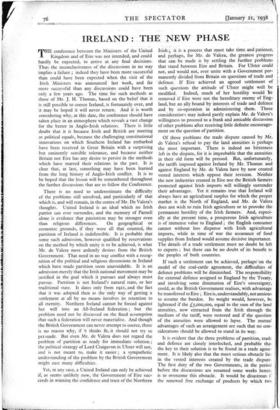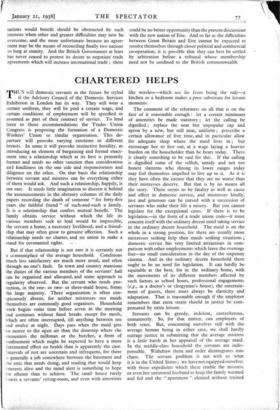IRELAND : THE: „NEW PHASE
THE conference between the Ministers of the United Kingdom and of Eire was not intended, and could hardly be expected, to arrive at any final decisions. Thus the inconclusiveness of the discussions in no way implies a failure ; indeed they have been more successful than could have been expected when the visit of the Irish Ministers was announced last week, and far more successful than any discussions could have been only a few years ago. The time for such methods as those of Mr. J. H. Thomas, based on the 'belief that it is still possible to coerce Ireland, is fortunately over, and it may be hoped it will never return. And it is worth considering why, at this date, the conference should have taken place in an atmosphere which reveals a vast change for the better in Anglo-Irish relations. There is little doubt that it is because Irish and British are meeting as political equals, because the challenging constitutional innovations on which Southern Ireland has embarked have been received in Great Britain with a surprising but eminently sensible tolerance, and because neither Britain nor Eire has any desire to persist in the methods which have marred their relations in the past. It is clear that, at last, something may have been learned from the long history of Anglo-Irish conflict. It is to be hoped that the lesson will be remembered throughout the further discussions that are to follow the Conference.
There is no need to underestimate the difficulty of the problems still unsolved, and particularly of that which is, and will remain, in the centre of Mr. De Valera's thoughts. United Ireland is an ideal which no Irish patriot can ever surrender, and the memory of Parnell alone is evidence that patriotism may be stronger even than religious differences. On geographical or economic grounds, if they were all that counted, the partition of Ireland is indefensible. It is probable that some such admission, however qualified by reservations on the method by which unity is to be achieved, is what Mr. de Valera most ardently desires from the British Government. That need in no way conflict with a recog- nition of the political and religious dissensions in Ireland which have made partition seem unavoidable. It is an admission merely that the Irish national movement may be justified in the goal which it pursues and always must pursue. Partition is • not Ireland's natural state, or her traditional state. It dates only from 192,f, and the fact that it was adopted then as the only way of getting "a settlement at all by no means involves its retention to all eternity. Northern Ireland cannot be forced against her will into an All-Ireland federation ; but the problem need not be discussed on the fixed assumption that such a federation will never materialise. And though the British Government can never attempt to coerce, there is no reason why, if it thinks fit, it should not try to persuade. • But even Mr. de Valera does not regard the problem of partition as ready for immediate solution ; the political strategy of Lord Craigavon in Ulster will not, and is not meant to, make it easier ; a sympathetic understanding of the problem by the British Government might ease many difficulties.
Yet, in any case, a United Ireland can only be achieved if, as seems unlikely now, the Government of Eire suc- ceeds in winning the confidence and trust of the Northern Irish it a process that must take time, and patience, and perhaps, for Mr. , de .Valera, the greatest progress that can be made is by settling the further problems that stand between Eire and Britain. For Ulster could not, and would not, ever unite with a Government per- manently divided from Britain on questions of trade and `defence. If Eiie" achieved an agreed settlement of such questions the attitude of Ulster might well be modified. Indeed, much of her hostility would be removed if Eire were not the hereditary enemy of Eng- land, but an ally bound by interests of trade and defence and by co-operation in administering them. These considerations may indeed partly explain Mr. de Valera's willingness to proceed to a frank and amicable discussion of other problems after receiving little definite encourage- ment on the question of partition.
Of those problems the trade dispute caused by Mr. de Valera's refusal to pay the land annuities is perhaps the most important. There is indeed no bitterness left in the dispute, for it is improbable that the annuities in their old form will be pressed. But, unfortunately, the tariffs imposed against Ireland by Mr. Thomas and against England by Mr. de Valera have by now created vested interests which oppose their revision. Neither the new industries created in Eire nor the British farmers protected against Irish imports • will willingly surrender their advantages. Yet it remains true that Ireland will always have an agricultural surplus for which the proper market is the North of England, and Mr. de Valera does not wish to ruin Irish agriculture or to provoke the permanent hostility of the Irish farmers. And, especi: ally at the present time, a prosperous Irish agriculture is of immense value to England ; the English consumer cannot without loss dispense with Irish agricultural imports, while in time of war the assurance of food supplies from Ireland would assume decisive importance. The details of a trade settlement must no doubt be left to experts ; but there can be no doubt of its benefit to the peoples of both countries.
If such a settlement can be achieved, perhaps—on the model of the coal-cattle agreement, the- difficulties of defence problems will be diminished. The responsibility for external defence assigned to England by the Treaty, and involving some diminution of Eire's- sovereignty, could, as the British Government realises, *ith advantage be transferred to Eire ; Eire is, understandably, notanxious to assume the burden. Its weight would, however, be lightened if the L5,000,000, equal to the sum of the land annuities, now extracted from the Irish through the medium of the tariff, were restored and if the question of the annuities were allowed to lapse. The mutual advantages of such an arrangement are such that no con- siderations should be allowed to stand in its way.
It is evident that the three problems of partition, trade and defence are closely interlocked, and probable that the key to their solution is to be found in a trade agree- ment. It is likely also that the most serious obstacle lies in the vested interests created by the trade dispute. The first duty of the two Governments, in the periOd before the discussions are resumed some weeks hence, is to overcome this obstacle. It would be disastrous if the renewed free exchange of products by which two nations would benefit should be obstructed by such interests when other and greater difficulties may now be- overcome, and the more unfortunate because an agree- ment may be the means of reconciling finally two nations so long at enmity. And the British Government at least has never ceased to protest its desire to negotiate- trade agreements which will increase international trade; there could be no better opportunity than the present discussions with the new nation of Eire. And so far as the difficulties between Great Britain and Eire cannot be expected to resolve themselves through closer political and commercial co-operation, it is possible that they can best be settled by arbitration before a tribunal whose membership need not be confined to the British commonwealth.















































 Previous page
Previous page